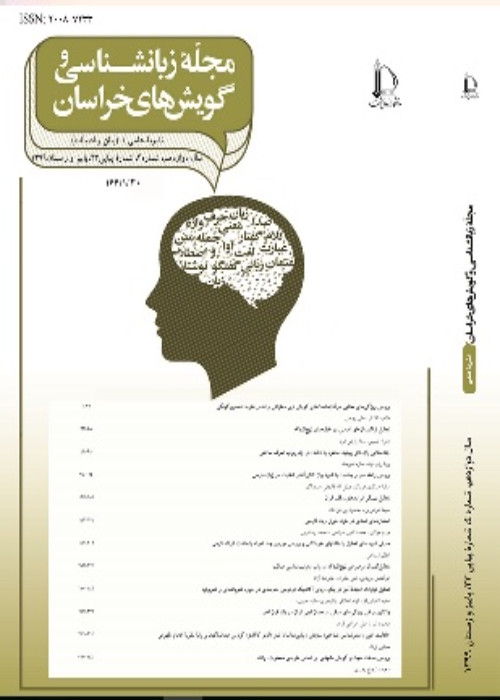Canonical Verbal Agreement in Zein-Abadi Dialect
Author(s):
Article Type:
Research/Original Article (دارای رتبه معتبر)
Abstract:
Introduction
Agreement is one of the most important morpho-syntactic categories in linguistics. It commonly refers to systematic covariance between the semantic and formal property of one element and the formal property of another element. Agreement system of any languages contains six important elements: 1) controller, 2) target, 3) domain, 4) feature, 4) value, and 6) condition. The agreement system is distinct in different languages, and the extent to which agreement is used differs from one language to another language. It depends on language-specific factors in which contexts agreement is obligatory, optional, or even excluded. Due tohe importance of identifying these factors, in this corpus-based study, we tried to investigate the verbal agreement system in "Zein-Abadi" dialect. "Zein-Abadi" dialect is spoken by the Behdinan “the people of the Good Religion,” in other words, Zoroastrianism, who live in, Zein- Abad. Zein Abad is a village that is located in Yazd province.Theoretical Framework
Corbett (2001) discussed six elements that are important in the canonical agreement. The element which determines the agreement is the controller. The element whose form is determined by agreement is the target. The domain of agreement is the syntactic environment in which agreement occurs (the clause for instance). Features are agreement categories such as number, person, and gender. Value is the classification of feature. For example, numbers in Persian have the values of singular and plural, but Arabic has singular, dual, and plural value. Conditions are the external factor which affect the domain of agreement. Agreement based on the grammatical number can occur between the verb and the subject. In a simple example like "she runs", the form "runs" is singular, agreeing in number with "she". This is information about the number of runners (just one), and it matches that expressed in its source "she". Patterns of agreement vary dramatically cross-linguistically, with great diversity in expression and types of variation found. Agreement is influenced by the conflicting effects of sentence structure and meaning and also metalinguistic (e.g., syntactic, semantic, and social) factors.
Methodology
In this corpus-based study, we tried to investigate the agreement system in "Zein-Abadi" dialect. Therefore, we gathered a written corpus consisting of "9881" verbal clauses and analyzed our research data according to canonical agreement theory of Corbett (2001). Within his criteria, we consider our database on three criteria which involve:The presence or absence of a controller:
Several criteria are related to the controller. An important one is that canonical controller is present. Compare these two examples:
a) xišân va mardom-e vey xâmuš namânand (Beyhaghi, 1345, 147).
SBJ.3nd Pl V. PRS.3rd Pl
'His relatives and his people will not be silent'
b) Ø open the window
Ø V. PRS.2nd Obj
In the first example (from Persian), the controller is present, while in the second one (from English), it is absent, so we see canonical type (a).
The match between the controller and the target characteristic:Based on these criteria, in canonical agreement, the values of controller and target match together. To clarify, we have to address examples like this one:
c) The committee have decided
d) The committee has decided
We cannot simply say that committee in example (c) is plural since we do not know these committees. From the feature value point of view, we can say that example (c) is less canonical than example (d).
The condition or absence of a condition in the match:The construction which has a condition is less canonical than the construction with no condition. In Persian, if the subject consists of inanimate singulars, the verb will be singular.
e) yek setare dar âsemân mideraxšad
star. SBJ.3nd Sg in sky shine. V. PRS.3rd Sg
'One star shines in the sky'
However, if the subject consists of inanimate plurals, the verb will be singular or plural.
f) setaregan dar âsemân mideraxšand/ mideraxšad
Stars.SBJ.3nd Pl in sky shine. V. PRS.3rd Pl/ PRS.3rd Sg
'The stars shine in the sky'
Conclusion
The three syntactic, semantic, and socio-linguistic factors (politeness) are among the most influential factors in Zein -Abadi dialect. Analysis of the investigation presents, in 3364 verbal clauses form 9881 verbal clauses equaling "34/05" percent of the corpus, there are also syntactic and semantic agreement between controllers and targets, and in 6517 verbal clauses, equaling 65/95 percent of the corpus, there are no syntactical and semantic agreement between controllers and targets. In non-canonical cases, Pro-drop clauses with 95/35 percent are most effective, then comes the animacy with 3/71 percent, and social politeness with 0/94 percent makes structures with non-canonical forms of verbal agreement.Keywords:
Language:
Persian
Published:
Journal of Linguistics & Khorasan Dialects, Volume:10 Issue: 19, 2019
Pages:
97 to 118
magiran.com/p2012816
دانلود و مطالعه متن این مقاله با یکی از روشهای زیر امکان پذیر است:
اشتراک شخصی
با عضویت و پرداخت آنلاین حق اشتراک یکساله به مبلغ 1,390,000ريال میتوانید 70 عنوان مطلب دانلود کنید!
اشتراک سازمانی
به کتابخانه دانشگاه یا محل کار خود پیشنهاد کنید تا اشتراک سازمانی این پایگاه را برای دسترسی نامحدود همه کاربران به متن مطالب تهیه نمایند!
توجه!
- حق عضویت دریافتی صرف حمایت از نشریات عضو و نگهداری، تکمیل و توسعه مگیران میشود.
- پرداخت حق اشتراک و دانلود مقالات اجازه بازنشر آن در سایر رسانههای چاپی و دیجیتال را به کاربر نمیدهد.
In order to view content subscription is required
Personal subscription
Subscribe magiran.com for 70 € euros via PayPal and download 70 articles during a year.
Organization subscription
Please contact us to subscribe your university or library for unlimited access!


